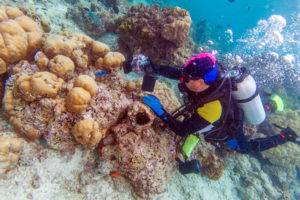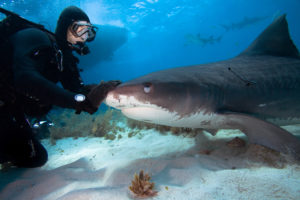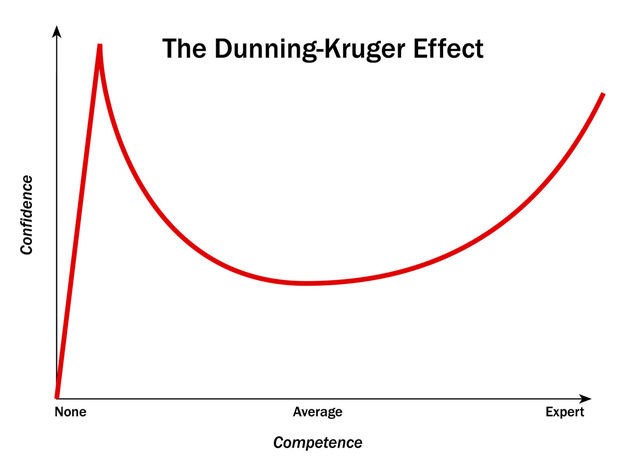Passing your initial scuba training takes hard work and dedication. In your Open Water class, you learn many foundational skills. You’ll expand on the basics in Advanced Open Water by completing deeper dives and practicing some task loading. But AOW is just the beginning of a long road when it comes to gathering diving knowledge, experience and expertise. Novice divers tend to make some common mistakes. Some are simply embarrassing; some can compromise your safety. What are the top mistakes new divers make? And how do you avoid them?
Mistake No. 1: Not doing your homework
Arriving at a dive resort without researching the area’s style of diving can take new divers unaware. Because diving is such a rich and varied activity, any number of variables can dictate whether the diving in the area is suitable for you. You may need to hike up and down the beach for shore dives with your scuba gear on in the heat. There may be strong currents, and you may need to use a DSMB. Depths may exceed your training limits, or cold water might mean you need a drysuit. Local rules might mean you can’t use your gloves, or boat rides out to dive sites might take considerably longer than you thought — you get the picture.
Solution
This one is easy: prepare. Search the internet to find out about the area’s diving before you book the trip. Email the dive operator and ask specific questions about the conditions and dive difficulty. You’re likely going to spend a considerable amount of money on your trip, so spend some time up front doing your research. If the destination seems unsuitable, change gears.
Mistake No. 2: Not checking (or practicing with) your equipment
Having qualified as a diver, it’s your responsibility to keep your skills fresh. Once qualified, though, some novice divers will leave a considerable amount of time (sometimes until their next annual vacation) before diving again. If you’re going on a diving trip and haven’t submerged for a while, book a scuba review session with your local dive center. Before you leave on your trip, make sure you know how to assemble a scuba unit. Practice your in-water skills, including weight checks, mask clearing, and regulator recovery. Review emergency protocols, such as air-sharing and out-of-air procedures, before you arrive at the resort.
If you have new or freshly serviced equipment, test it out in the local pool before your trip. If you bought a new dive computer, don’t pull it out of the box two minutes before the dive and ask the guide for a crash course. Play with it in shallow water or in the pool of your local center before your trip. Diving at 100 feet (30 m) is not the place to figure out the display and functionality of your new toy.
Solution
Make sure that both you and your dive gear are ready for the trip. Take a refresher if it’s been a while since you dove, and get up-to-date on any procedural changes. Service and test your equipment. Learn how to use your new gadgets before you depart.
Mistake No. 3: Skipping your buddy check
Once out of the glare of the instructor’s gaze, many new divers disregard the most basic safety procedures. And pre-dive checks, colloquially known as buddy checks, are often one of the first things to go.
Instructors teach the pre-dive safety check for good reason. It’s a concise and methodical way to ensure that you’re prepared for the dive and that you haven’t missed anything.
While, depending on the location, resort-based dive guides usually ask divers to make buddy checks, certification means that the responsibility ultimately rests with the individual diver. In dive resorts around the world, guides, divemasters and instructors recount tales of novices who skipped the pre-dive safety check and jumped into the water without a weight belt, fins, masks, etc. At best this is embarrassing; at worst, dangerous.
Solution
Don’t forget the basics or think you don’t need a buddy check. Do your pre-dive safety checks. Insist that your buddy does a check with you for both your safety and comfort.
Mistake No. 4: Taking a camera too soon
Rather than honing their skills, buying their own well-fitting gear, or getting more experience, many brand-new divers rush out and immediately buy a GoPro camera, or something like it, to take on every dive. It’s understandable; scuba diving is amazing, and discovering the underwater world is thrilling. Many novices can’t wait to share their new hobby on social media.
However, a GoPro camera or equivalent in the hands of a novice diver can be like asking a newly licensed driver to drive on a busy road while talking on their cell phone. Focusing on your camera before you’ve honed your dive skills can lead (at best) to bumping into other divers and the surroundings. At worst, you could lose buoyancy control and separate from your buddy or the dive group. In some circumstances, novice divers will chase pelagic life with a camera — always a no-no anyway — completely unaware that they’re heading down to depth or drifting toward the surface. Any of these scenarios can frustrate your dive guide or buddy. Worse, they all have potentially dangerous consequences.
Solution
Leave the camera at home when you begin your diving career. Better yet, don’t buy one at all until you’ve mastered buoyancy control and situational awareness. Once you do start diving with a camera, mount it in a position where you can clip it to your gear and handle another task with both hands. If it’s going to be a challenging dive, let the camera sit one out.
 Mistake No. 5: Ignoring the rules
Mistake No. 5: Ignoring the rules
The power of that fresh certification card can lead some new divers to disregard core diving guidelines, whether it’s planning the dive incorrectly, or not planning the dive at all. New divers may ignore turn points or time limits, disregard depth limits, or simply fail to dive near their buddy. Entering an unfamiliar wreck without the correct training, for example, can have catastrophic repercussions. Similarly, solo diving without the correct training, equipment and gas redundancy can have terrible consequences if things go wrong.
Solution
If you want to challenge yourself when it comes to diving, acquire the knowledge, training and experience it will take to properly make that dive. This is not a sport where you want to wing it, and YouTube tutorial videos and bravado are no substitute for the correct training.
Mistake No. 6: Thinking you’re a better diver than you are
Tying in directly with the point above, sometimes a little knowledge can be a dangerous thing. Cornell University psychologists David Dunning and Justin Kruger noted that novices tend to believe they are much more competent than they really are. Put simply, people don’t know that they don’t know certain things…because they don’t know them. Still with me?
This phenomenon is on full display in scuba diving. The rush of confidence from being a newly qualified diver with 20, 30, or 40 logged dives can lull novices into a false sense of security in their own knowledge and ability.
This overconfidence can sometimes manifest when novice divers don’t feel the need to listen to the dive briefing or adhere to the procedures and advice of local divemasters and guides. Their self-confidence makes them think they already have sufficient skills and knowledge, and can leave the diver in a dangerous situation.
Confidence in their own ability begins to fall as a diver starts to realize how little they really know. The curve begins an upward trajectory again as the diver actively gathers more knowledge and experience.
Being an “expert” diver is an ongoing project. There’s always more to learn, whether you’ve got 30 or 3,000 logged dives, whether you’re a recreational, professional or technical diver.
Solution
We’re all learning on every dive. Listen to and digest advice from local dive guides and instructors. They likely know the local waters and dive procedures much better that you do, and are there to make your dive safer and more enjoyable.




